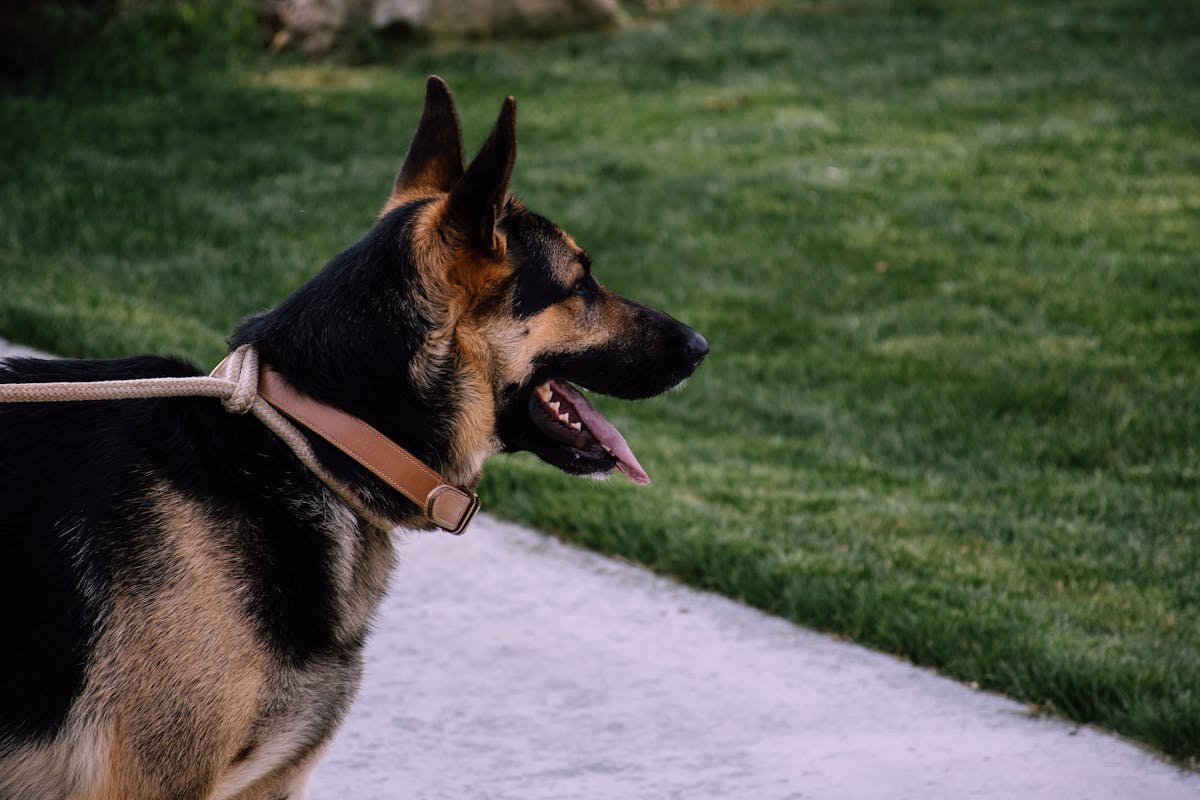German Shepherds are one of the world’s most popular dog breeds. Most owners rever them for their intelligence and loyalty, they excel in diverse roles.
From working dogs to beloved family members, they hold an irreplaceable place in our lives. They are more than just pets; they are companions, protectors, and friends.
The breed captivates people globally, winning hearts with their courage and companionship. Their unique combination of strength and empathy creates bonds that are unforgettable. German Shepherds offer a legacy of devotion, forming deep attachments to those who care for them.
Table of Contents
ToggleHistorical Origins: From Herding Fields to Global Recognition
German Shepherds originated in Germany during the late 1800s. Max von Stephanitz, a German cavalry officer, recognized their potential. He bred them for herding and protecting sheep.
Soon, their agility and intelligence stood out. These traits gained attention, especially during the World Wars. Soldiers admired their reliability on the battlefield. After the wars, German Shepherds spread globally, captivating new countries.
Their versatility and strength led them to diverse roles beyond herding. Today, they are symbols of loyalty, intelligence, and resilience, celebrated worldwide for their rich heritage.
The Essence of a German Shepherd’s Temperament
German Shepherds have a distinct temperament that sets them apart. They are loyal, courageous, and protective, forming strong family bonds.
Their watchful nature makes them reliable guardians. Yet, they are gentle and affectionate with loved ones. Around strangers, they may seem cautious.
However, this reserve shows their instinct to protect. German Shepherds are not overly trusting, but they are loyal beyond measure.
Finally, these traits make them a trustworthy breed, combining affection with a natural guard-dog instinct. Their balanced temperament suits a wide range of roles.
What Makes Them Ideal Working Dogs
German Shepherds are incredibly intelligent and trainable. They quickly grasp new commands, adapting well to different tasks.
Furthermore, their problem-solving ability makes them versatile workers. Whether in police work or rescue missions, they excel. Their sharp minds thrive on training challenges.
Owners and trainers alike find them easy to teach. However, they need structured environments and clear boundaries.
Consequently, this eagerness to learn makes them ideal for roles like search and rescue. German Shepherds’ intelligence is a core reason for their popularity in professional fields.
Physical Characteristics
German Shepherds have a striking physical presence. Their strong, muscular bodies give them a powerful, confident appearance.
German Shepherds are built for endurance as they can handle tough tasks. They move with a unique gait, blending power with grace.
Their double coat, dense and weather-resistant, protects them in varied climates. Upright ears and keen, intelligent eyes add to their alert look.
These physical traits serve a purpose; they’re not just for show. Their agility, strength, and resilience make them ready for action in any environment.
Health Profile: Common Health Concerns in German Shepherds
Hip and Elbow Dysplasia
Hip and elbow dysplasia are among the most common concerns. These conditions involve abnormal formation of the hip or elbow joints, causing pain and limited mobility. Due to their active lifestyle and larger size, German Shepherds are more susceptible.
Dysplasia can develop gradually, with symptoms often appearing in mid to later life. Regular vet check-ups and early diagnosis are critical for managing discomfort. In severe cases, surgical intervention might be necessary to improve quality of life.
Degenerative Myelopathy (DM)
Degenerative myelopathy is a progressive neurological disease that affects the spinal cord. German Shepherds are genetically predisposed to this condition, which usually appears in older dogs.
DM impacts their hind legs first, leading to weakness and difficulty walking. Unfortunately, there is no cure, and the condition can worsen over time.
However, physical therapy, regular exercise, and certain medications can help manage symptoms, maintaining their comfort and mobility as long as possible.
Gastric Dilatation-Volvulus (Bloat)
German Shepherds can also be at risk for gastric dilatation-volvulus, commonly known as bloat. This condition occurs when the stomach fills with gas and twists, cutting off blood flow and causing extreme pain. Bloat is a medical emergency that requires immediate veterinary attention, as it can be fatal if untreated.
To reduce the risk, owners should avoid exercising their dogs right after meals and feed them in smaller portions throughout the day. Special elevated feeders may also help in preventing this issue.
Exocrine Pancreatic Insufficiency (EPI)
Exocrine pancreatic insufficiency (EPI) is a condition where the pancreas fails to produce enough enzymes to digest food properly. EPI leads to weight loss, diarrhoea, and poor coat condition, despite an otherwise healthy appetite.
Fortunately, enzyme replacement therapy can manage EPI effectively, allowing the German Shepherd to live a normal, active life. Early detection is key, and once diagnosed, it’s manageable with enzyme supplements mixed into their meals.
Allergies and Skin Conditions
German Shepherds can develop skin allergies, which may stem from environmental factors, diet, or even genetic predisposition. These allergies can lead to itchy skin, redness, and excessive scratching.
A veterinarian can determine the allergy’s cause, whether it’s from certain foods, fleas, or pollen, and recommend treatments such as dietary changes or medicated shampoos. Regular grooming can also help detect skin issues early and maintain their coat’s health.
Vision and Eye Issues
Like many larger breeds, German Shepherds are prone to certain eye issues, including cataracts and progressive retinal atrophy (PRA).
PRA is a hereditary condition that causes gradual vision loss and, ultimately, blindness. While PRA has no cure, it is painless, and dogs can adapt well with proper care.
Cataracts, on the other hand, can often be managed surgically. Regular eye exams can help catch these conditions early, allowing for treatment and adjustment in lifestyle if necessary.
Importance of Regular Check-Ups
Routine veterinary check-ups play an essential role in maintaining a German Shepherd’s health. Vets can monitor for early signs of joint issues, metabolic conditions, and any emerging health concerns.
Preventative care, including vaccinations, dental checks, and blood work, can extend the quality and length of a German Shepherd’s life. Genetic testing can also identify potential inherited issues, helping owners take proactive measures.
Life Expectancy and Care Through Different Life Stages
German Shepherds live between 9 and 13 years, though some reach their teens. Each life stage brings different care needs. Puppies require training, socialization, and plenty of mental stimulation. As adults, they thrive on structure, regular exercise, and mental challenges. In their senior years, German Shepherds benefit from gentler routines and joint support. Adjusting care as they age ensures they live full, healthy lives. Meeting their evolving needs at every stage strengthens the bond between dog and owner.
Fueling a German Shepherd’s Active Lifestyle
An active lifestyle demands a nutrient-rich diet. German Shepherds need protein, healthy fats, and complex carbs to fuel their bodies.
High-quality dog food with real meat, vegetables, and grains suits them best. Large breed formulas are popular, containing joint-supporting ingredients like glucosamine.
Fresh water should always be available, and treats should be given sparingly. Overfeeding can lead to weight issues, so portion control is essential. A balanced diet contributes to their energy, health, and longevity.
Keeping Them Sharp and Fit
Exercise is vital for a German Shepherd’s well-being. These dogs have high energy levels and require daily physical activities.
Long walks, hikes, and runs are excellent for their stamina. Beyond exercise, mental stimulation is also crucial. Puzzle toys, obedience training, and scent games keep their minds engaged.
A lack of exercise and mental challenges can lead to boredom and frustration. Regular activity and mental engagement prevent behavioural issues and support their sharp minds and healthy bodies.
10. Socialization and Interaction: Managing Protective Instincts
Socialization is essential for German Shepherds to thrive. Their protective nature requires guidance to balance their instincts.
Early exposure to diverse people, animals, and places helps. This builds their confidence and teaches appropriate interactions.
Without socialization, they may develop excessive guarding behaviours. Regular playdates and training sessions improve their social skills.
A well-socialized German Shepherd knows when to guard and when to relax. They are excellent companions when they learn to distinguish between threats and friendly encounters.
German Shepherds in Service Roles: Military, Police, and Beyond
German Shepherds excel in various service roles. Their intelligence, loyalty, and bravery make them ideal for high-stakes tasks.
In military roles, they handle missions like bomb detection and tracking. Police forces worldwide rely on their scent-tracking abilities for criminal pursuits.
They also serve as therapy and assistance dogs, helping people with disabilities. In search and rescue, they locate missing persons with remarkable accuracy.
German Shepherds’ natural skills make them invaluable assets across numerous fields, proving their versatility and dedication.
Fun Facts and Lesser-Known Insights
German Shepherds are full of surprises. Many people are unaware that they have an innate love for swimming. They also possess an exceptional memory, often recalling specific commands and places years later. Their Hollywood fame, thanks to stars like Rin Tin Tin, highlights their appeal.
German Shepherds have also made history as some of the first guide dogs for the visually impaired. These quirks and achievements add to their allure, showcasing their fascinating personalities and unique skills.
Conclusion
German Shepherds bring an unmatched blend of loyalty, courage, and intellect. Owning one means gaining a devoted friend and protector.
These dogs enrich lives, whether through companionship, service, or heroics. Their journey from herding fields to global fame underscores their resilience and adaptability.
Embracing a German Shepherd means embracing a legacy of loyalty and strength. They are more than pets; they are partners, embodying a spirit that inspires respect and admiration worldwide.






